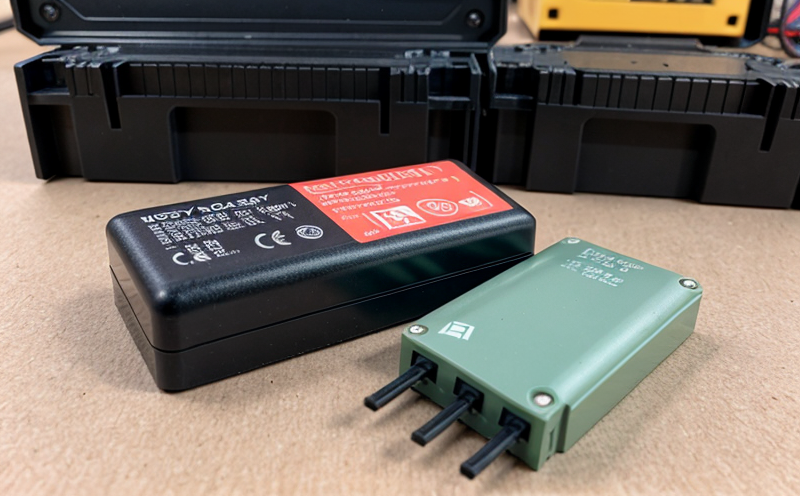ISO 18243 Lithium-Ion Battery Module Testing for Light Electric Vehicles
The European Standard ISO 18243:2017 is specifically designed to ensure the safety, reliability, and performance of lithium-ion battery modules used in light electric vehicles (LEVs). This standard addresses a wide range of tests that are critical for the validation and certification of these batteries. Testing according to this international specification helps manufacturers comply with regulatory requirements and demonstrates commitment to product quality.
ISO 18243 covers various aspects including electrical performance, mechanical integrity, thermal management, and safety features. It encompasses both functional and stress testing aimed at simulating real-world conditions under which the battery module will operate. This ensures that the battery can withstand environmental stresses such as temperature extremes, vibration, and overcharging without compromising its integrity or causing hazards.
The standard is particularly important for developers of electric scooters, motorcycles, and other small-scale electric vehicles where safety and longevity are paramount. Compliance with ISO 18243 helps manufacturers gain market access in Europe and ensures that their products meet the stringent safety standards set by regulatory bodies like the European Commission.
Our laboratory is equipped to perform comprehensive testing according to this standard, ensuring that our clients can meet the highest international quality standards. Our team of experts uses state-of-the-art equipment and follows rigorous protocols to provide accurate and reliable test results. The insights gained from these tests are invaluable for continuous improvement in product design and development.
The scope of ISO 18243 testing includes:
- Electrical Performance: This involves assessing the battery’s ability to deliver power under various load conditions.
- Mechanical Integrity: Evaluating how well the battery withstands physical stresses like vibrations or shocks.
- Thermal Management: Ensuring that the battery can maintain optimal operating temperatures and handle overheating scenarios safely.
- Safety Features: Checking the effectiveness of built-in safety mechanisms such as thermal fuses, pressure relief valves, and overcurrent protection circuits.
The testing process involves several stages. Initially, the battery module undergoes a series of functional tests to verify its basic performance parameters. Following this, it is subjected to mechanical stress tests, thermal cycling, and accelerated aging processes to assess durability and reliability under realistic operating conditions. Safety evaluations are conducted using controlled environmental chambers simulating different climates.
The data collected during these tests provides critical information on the battery’s behavior under various scenarios, which can be used for continuous improvement in product design and development. Compliance with ISO 18243 not only enhances safety but also contributes to reducing environmental impact by promoting the use of sustainable energy storage solutions.
Eurolab Advantages
At Eurolab, we pride ourselves on offering unparalleled expertise in battery testing. Our team consists of highly qualified professionals with extensive experience in the field, ensuring that every test conducted adheres to the highest standards.
We provide a range of services including initial consultation, detailed test plans tailored to your specific needs, and continuous support throughout the testing process. This approach ensures that you receive not just reliable data but also actionable insights that can drive innovation within your organization.
Our state-of-the-art facilities are equipped with cutting-edge technology, enabling us to perform precise and accurate tests. We use the latest software solutions for data analysis, which helps in providing detailed reports that are easy to understand yet comprehensive enough to meet all regulatory requirements.
In addition to our technical capabilities, we also offer excellent customer service. Our team is always available to answer any questions you may have and provide guidance on how best to proceed with your testing needs. We aim to build long-term relationships with our clients by exceeding expectations every time.
Why Choose This Test
Choosing ISO 18243 lithium-ion battery module testing is crucial for several reasons. Firstly, it ensures that your product meets the highest international standards for safety and reliability. Secondly, compliance with this standard can significantly enhance your brand reputation, making your products more attractive to consumers who prioritize quality.
Another key advantage is easier market access in Europe, where stringent regulations govern the sale of electric vehicles and related components. By demonstrating adherence to ISO 18243, you open doors to a broader customer base while maintaining high standards.
The testing process itself provides valuable feedback on areas that need improvement, allowing for iterative development cycles leading to better-performing products. It also helps in identifying potential issues early on before they become major problems during mass production or when the product is already in use.
Lastly, compliance with ISO 18243 can help reduce liability risks by ensuring that your batteries are safe and reliable under all intended uses. This peace of mind is invaluable for any manufacturer serious about protecting both their reputation and users' well-being.





